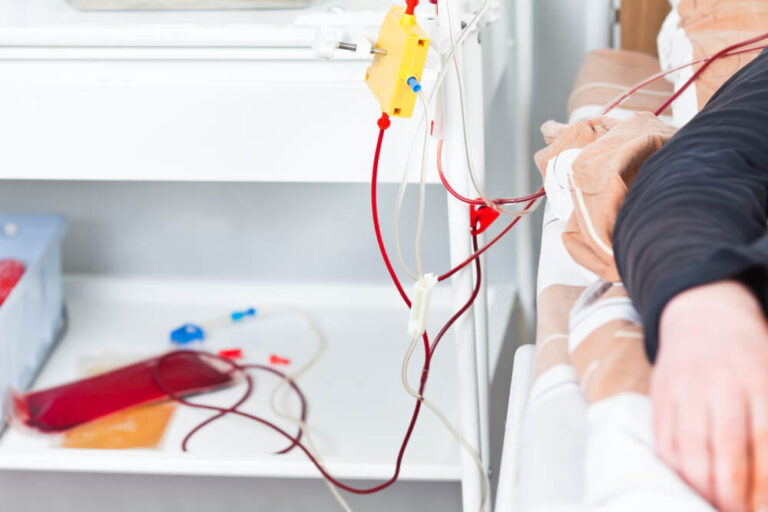Plasma Exchange procedures
Plasma Exchange(also known as apheresis, Plasmapheresis, or “plex”) is a medical procedure where a device separates whole blood into the cellular components and plasma. The plasma is then discarded and replaced with a colloid fluid, combined back with the cellular components, and returned to the same patient. The colloid fluid is typically a combination of human serum albumin and/or fresh frozen plasma. Typically, a large-bore, double-lumen catheter is used to provide a sufficient volume of blood to perform plasmapheresis over several hours.

- Symptoms
- Causes
- Treatments
Plasma cells are a type of white blood cell. In conditions such as myeloma and Waldenström’s macroglobulinaemia (a rare type of lymphoma), abnormal plasma cells may make large amounts of a protein called immunoglobulin. Immunoglobulin is also called a paraprotein.
Very high levels of immunoglobulin in the blood can cause it to become thicker than normal. This is sometimes called hyperviscosity syndrome. It can cause symptoms such as:
- headaches
- blurred vision
- abnormal bleeding
- confusion
- dizziness
- breathlessness.
Plasma exchange can be used to treat conditions such as myeloma and Waldenström’s macroglobulinaemia.
Feeling faint or light-headed
Sometimes you might feel faint or light-headed during plasma exchange. If this happens, tell your nurse or doctor straight away. Changing your position so that you are lying down usually helps with this. You may be given additional fluid into the vein.
You can eat and drink as normal. Try to eat breakfast and lunch on the day of treatment, as this can help to prevent you from feeling faint.
Tell your doctor if you take tablets to help control your blood pressure. They may ask you to stop taking them for a short time.
Numbness and tingling
You may feel numbness or tingling around your mouth and nose, or in your fingers, during the treatment. This is a side effect of a substance called citrate. Citrate is mixed with your blood to stop it clotting while it is outside your body. If the amount of citrate builds up, it can lower the levels of calcium in your blood for a time and cause numbness and tingling.
Tell the nurse or doctor straight away if you feel numbness or tingling sensations. They may give you a milky drink or calcium tablets, or pause the plasma exchange for 5 minutes. This is usually enough time for your body to readjust to the effects of citrate and for the symptoms to go away.
If the amount of calcium in your blood is slightly low, you may be given a calcium tablet before or after the plasma exchange
Before you have plasma exchange, your doctor will explain why it is being given. They may also give you information to read. You will be asked to give your permission (consent) for the hospital staff to do the plasma exchange. Medical treatment can only be given with your consent.
You may decide not to have a plasma exchange. It is important to tell your doctor or nurse if you decide not to have treatment. They will record your decision in your medical notes.
You do not have to give a reason, but it can be helpful to tell the staff your concerns, so they can give you the best advice.
Jehovah’s Witnesses may choose not to have some types of blood products. If this affects you, talk to your doctor about other treatments or ways of managing your condition.
